Frequently Asked Questions
Don’t forget to subscribe to the Mindful Ecotherapy Center’s Youtube Channel for the latest news and commentary, free lessons, useful resources, and mindful meditations!
COURSES CURRENTLY OFFERED BY THE MINDFUL ECOTHERAPY CENTER
About | About Mindfulness-Based Ecotherapy (MBE) | About MBE Certification | Books | Charlton Hall, MMFT, PhD | Contact | Directory | FAQs | Gallery | Help Center | Membership | Mindful Moments | NBCC ACEP #7022 | Privacy Policy | Refund Policy | Resources | Shopping Cart | Subscribe | Terms & Conditions | MBE on Youtube
Frequently Asked Questions (FAQs) about the Mindful Ecotherapy Center, LLC, and the programs we offer.
What is the Mindful Ecotherapy Center?
The Mindful Ecotherapy Center, LLC trains mental health professionals in ecotherapy and mindfulness. We are an approved provider of online continuing education with the National Board for Certified Counselors (NBCC) ACEP # 7022.
We have multiple online course offerings, and we usually add at least one course per month.
Subscribe to the monthly newsletter to learn more.

What is mindfulness?
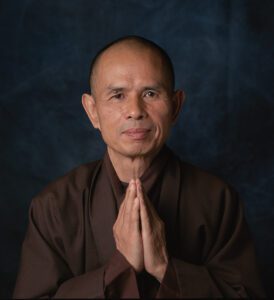
“Mindfulness is the energy of being aware and awake to the present moment. It is the continuous practice of touching life deeply in every moment of daily life. To be mindful is to be truly alive and present with those around you and with what you are doing. We bring our body and mind into harmony while we wash the dishes, drive the car or take our morning cup of tea.”
–Thich Nhat Hanh, Zen Buddhist Monk and Founder of the An Quang Buddhist Institute
Think about the things that have caused you anxiety, stress, or depression in the past. Now ask yourself, “Was it the things themselves that caused the anxiety, stress, and depression, or was it what I believed about those things?”
Can you think of anything that you’ve ever been worried about that wasn’t a product of your thoughts and feelings? Isn’t it true that the worries come from the thoughts and feelings themselves, and not from the situations in which you find yourself?
If it is true that anxiety and depression are rooted in our thoughts, then we should be able to change our thoughts and eliminate, or at least minimize anxiety and depression. Mindfulness is a way to change our thoughts. If you can change your thoughts, you can change your world.
The last two decades have seen an explosion in interest in the utility of Mindfulness for treating mental disorders. Consequently, there has been an interest in devising a clinical definition for the term “mindfulness.”
Kabat-Zinn (2003) refers to mindfulness as “…paying attention on purpose, in the present moment, and non-judgmentally to the unfolding of experience moment by moment.”
Segal et al., (2004) describe Mindfulness as a state of being “fully present and attentive to the content of moment-by-moment experience.”
According to Baer (2003), “In general, while the specific focus of mindfulness may vary, individuals are instructed to be aware of thoughts but to be removed from the content of these thoughts.”
What is ecotherapy?
For most of its existence, homo sapiens have lived in harmony with nature as hunter/gatherers. Such a lifestyle requires a vast knowledge of the seasons, and of the patterns and habits of wildlife, and of plants and herbs and their healing powers. Industrialization and urbanization are fairly recent phenomena on an evolutionary scale. We still carry the genetic memory of our ancestors who lived in untamed nature. Our brains are wired for the outdoors and nature. A growing body of research demonstrates that not only do we feel better when we make time for nature, but it is actually a requirement for good physical and mental health!
The field of ecopsychology studies how humans interact with nature. Ecopsychology is a philosophy combining elements of psychology and ecology. It is the philosophy that mental health is contingent upon the health of the environment. Humankind and the environment are part of an interrelated system. We are not separate from nature. We are a part of nature.
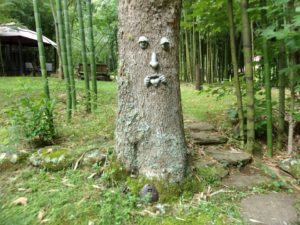
At its core, ecopsychology suggests that there is a synergistic relation between planetary and personal well-being; that the needs of the one are relevant to the needs of the other. In short, what we do to the environment, we do to ourselves. Ecotherapy is the practical application of this knowledge. In ecotherapy nature is the “therapist.” In practicing the techniques of ecotherapy, we allow the healing power of nature to work its magic on us. Hölzel et al (2011) demonstrated that meditative states of mindfulness stimulate neural growth in the cerebral cortex in the areas of the brain responsible for emotional regulation, good judgment, insight, and impulse control. Nature experiences have been demonstrated in several studies to produce meditative states (fascination, relaxation, and mindfulness).
Experiences in and with nature, or natural experiences, are ways in which we consciously choose to allow nature to work its healing magic on us. Some types of natural experiences include:
Facilitated Wilderness Experiences
In these types of experiences, a trained facilitator takes you into the woods for an adventure. These events can be anything from a wilderness experience in ecotherapy led by a therapist or counselor, to a hunting trip led by a wilderness guide. Kuo & Taylor (2004) demonstrated that therapy and other activities conducted in outdoor settings reduced symptoms of Attention-Deficit Hyperactivity Disorder. Whittington (2006) found that wilderness skills training gave adolescent girls increased self-esteem and self-confidence and helped to shatter gender stereotypes.
Animal Assisted Therapy
Animal therapy in the form of contact with pets and/or wild or domesticated animals enhances self-actualization and can lessen symptoms of depression. Antonioli & Reveley (2005) found that simply swimming with dolphins can greatly reduce symptoms of depression. Other studies have shown that owning pets, or even just watching fish in an aquarium, can greatly reduce stress. Equine Therapy uses horses to facilitate mental and physical wellbeing. There are many other ways that animals can help us lead happier lives, as any pet owner can tell you!
Therapeutic Gardens
Sempik & Spurgeon (2006) demonstrated that therapeutic gardening reduces stress and lessens symptoms of depression. Blair (2009) discovered that gardening can be used as a means of helping school children to enhance self-sufficiency, social identity, meaning, and self-integration. There’s just something very healing about planting something and nurturing it as you watch it grow.
Vacations
Sponselee, et al (2004) discovered that outdoor activities reduce stress and restore energy. If you’ve ever had to miss a vacation, you’re probably painfully aware of the regenerative power of taking a week or so off to spend time in nature. Roggenbuck & Driver (2000) found that you don’t need a facilitator or guide to enjoy the health and well-being benefits of the use of wilderness areas. There’s a reason we’re attracted to beaches and national parks!
Architecture Incorporating Natural Spaces
Nature can be incorporated into the home environment through the use of plants, an aquarium, or even recorded nature sounds. Alvarsson et al (2010) studied the positive mental health effects of listening to nature sounds.
Outdoor Classrooms
Purcell, et all in 2007 revealed that outdoor classrooms enhanced many critical factors of the educational experience, including enhanced retention, better focus, more attention to detail, less hyperactivity, more relaxation, increased confidence and self-esteem, and better cognitive functioning.
What is Mindfulness-Based Ecotherapy?
Mindfulness-Based Ecotherapy (MBE) is a blending of Mindfulness and Ecotherapy. MBE uses nature to facilitate mindful awareness to help individuals and families to find deeper connections in their own lives, and to give more meaning and enjoyment to the activities of daily living.
Mindfulness-Based Ecotherapy consists of 12 skill sets. The skills of Mindfulness-Based Ecotherapy (MBE) include:
1: Mindful Awareness
Mindful Awareness is a way of tuning in to what is happening right now, at this moment. It is a shift from doing mode into being mode. Mindful Awareness involves the skills of Observing, Describing, Fully Participating, Being Non-Judgmental, Focusing on One Thing at a Time, and the Power of Intention. Mindfulness-Based Ecotherapy (MBE) teaches you these skills.
2: Radical Acceptance
Mindful Awareness teaches us the art of acceptance. Emotional reactions to our circumstances are natural, but that doesn’t mean that we have to respond to these emotions. The mindfulness skill of acceptance teaches us that we can experience these emotions without engaging in cycles of behavior that lead us to negative consequences. Acceptance teaches us that we are not our thoughts and that we are not our emotions. At any time we can choose which thoughts and emotions we wish to respond to. If, at any time, we should engage in thoughts and behaviors that lead to negative consequences, this does not mean that we have become bad persons. This simply means that we are human beings, and as humans, we are entitled to make mistakes. Each mistake is an opportunity for growth and learning. Forgiveness is a skill and an art. The place to start with learning the art of forgiveness is in learning first to forgive ourselves when we make mistakes. Mindfulness-Based Ecotherapy (MBE) teaches you the art of Radical Acceptance.
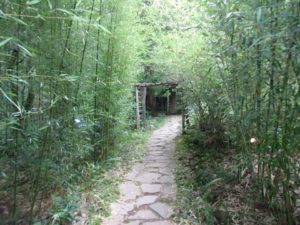
3: Wise Mind and Wise Body
When you are being logical, rational, and devoid of emotion, you are said to be in Rational Mind. When you are allowing your thoughts to be driven by your emotions, you are said to be in Emotional Mind. The idea of Mindfulness-Based Ecotherapy is to achieve Wise Mind. The Mindfulness concept of Wise Mind is the joining of Rational Mind and Emotional Mind in perfect balance and harmony. It is a moving beyond opposites to a mindful state of acceptance. Likewise, when we come to realize that there is no line between mind and body and that they are one and the same, we are able to move beyond the duality that implies that mind and body are separate entities. From there we see that the body can change the mind, and the mind can change the body. Wise Mind is the first step to living in True Self. Mindfulness-Based Ecotherapy (MBE) gives you some of the tools you will need to help you develop your own Wise Mind and your own Wise Body.
4: Letting Go
The art of Mindful Acceptance can best be described as the Art of Letting Go. Once you have done everything in your power to solve a problem, you have done all you can, so at that point worry and stress are counterproductive. Note that letting go of the stress and anxiety doesn’t necessarily mean letting go of the problem itself. For example, suppose you have a car payment coming up, and you don’t have the money to pay it. This would naturally cause you anxiety. If, after brainstorming for solutions, you find that you still don’t have the money to pay the car payment, then at that point you’ve done all you can do. So at that point, you let go of the anxiety associated with the problem. That doesn’t mean that you let go of car payments altogether. You’ll make the payment when you can. In this instance, “letting go” just means that you won’t worry about not being able to make the payment. The energy you might have used worrying about the situation could be put to better use in trying to come up with solutions. Mindfulness-Based Ecotherapy (MBE) teaches us how to let go through the power of radical acceptance.
5: Living in the Now
Living in the Now means leaving Doing Mode and entering Being Mode. In Being Mode we learn that there is no past, and there is no future. There is only this present moment. Living in the Now means allowing yourself to be in this moment…here and now. Mindfulness-Based Ecotherapy (MBE) teaches you the skills of Living in the Now.
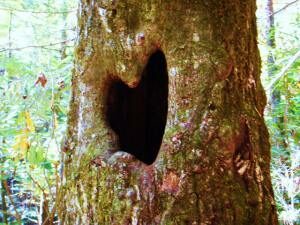
6: Centering
Centering yourself is allowing yourself to get in touch with and being open to your True Self. It is allowing yourself to realize that you are perfect just as you are, even with your imperfections, because those feelings and desires are also a part of who you really are. If you accept your imperfections and integrate them into your way of thinking and feeling about yourself, you will obtain peace of mind, and you will be centered. Mindfulness-Based Ecotherapy (MBE) teaches you how to Center.
7: Connecting
Suppose you could take all the spiritual paths practiced worldwide, put them into a cauldron, and boil them down to their essence. What would remain? I believe that the common thread to all spiritual practices is a feeling of connection. In this sense, spirituality means connection to others, or connection to the divine, or simply connection to nature and to ourselves. In short: spirituality is connectedness. If you think back on the spiritual experiences you’ve had in your lifetime, do recall feeling connected on some level? Many describe spiritual experiences as a sense of oneness. Oneness implies a connection to something outside ourselves. In this sense, even an agnostic or an atheist could achieve spirituality through connection. Mindfulness-Based Ecotherapy (MBE) can be one of the paths you use to reconnect to spirit.
8: Nature as Metaphor
Each of us lives in our own personal fairy tale called “my life.” We all have good things that happen to us, and we all have bad things that happen to us. We create our own personal myths by choosing which things to focus on in our own lives. The good news about the myth of our lives is that we are the authors. So if we don’t like the way the story is going, we have the power to do a rewrite at any time. We can’t always choose the circumstances of our lives, but we can always choose the story we create about those circumstances. If you go out into the woods and start observing things, you will notice something begin to happen. You will begin to create stories about the events you observe there in the forest. These stories that spring to mind in the woods can tell you a great deal about what is going on in your own unconscious mind if you know how to pay attention to them. Mindfulness-Based Ecotherapy (MBE) teaches you how to pay attention to those stories.
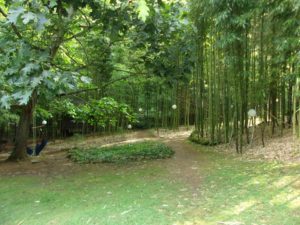
9: Nature as Teacher
Our ancestors knew hundreds of medicinal uses of local plants and herbs. They knew the seasons, when to plant, when to harvest, how to forecast the weather by the behavior of plants and animals, and a host of other things based on their observations of nature. The lessons our ancestors learned haven’t gone away. They’re still there, waiting in the forest like an open book. All we have to do is to learn how to read it. Mindfulness-Based Ecotherapy (MBE) teaches us the language of nature so that we may read its “book.”
10: Nature as Nurture
A large and growing body of research has demonstrated that nature has incredible healing and nurturing powers. People who go into the woods become calmer, more relaxed, less stressed, and healthier. Mindfulness-Based Ecotherapy (MBE) can be used to tap into the nurturing power of nature.
11: Nature as Healer
Research continues to demonstrate the healing power of nature. People in hospital rooms that have windows overlooking a garden recover faster than those who do not. People who swim with dolphins recover from depression more quickly than people who take antidepressants. Children with ADHD who play outdoors regularly display fewer symptoms than those who do not. These are just a few examples of the many beneficial effects of the healing power of nature. Mindfulness-Based Ecotherapy (MBE) helps you to connect to this healing power
12: Living in True Self
Do you remember a time when you knew exactly who you were, what you wanted to be, and where your life was going? When you do something that isn’t healthy for you, or make a mistake, which part of you is it that recognizes the mistake? What part of you is it that holds the highest dreams and aspirations for your life? Mindfulness-Based Ecotherapy (MBE) recognizes that part of you as your True Self. The ultimate goal of Mindfulness-Based Ecotherapy (MBE) is to realize your True Self, and to live in it. Doing so allows you the opportunity to reconnect in positive ways with nature, with others, and with yourself.
Will my licensure board accept my coursework through the Mindful Ecotherapy Center?
The Mindful Ecotherapy Center offers online courses in mindfulness, ecotherapy, and related topics.
We specialize in online training for mental health professionals. We are a National Board for Certified Counselors Approved Continuing Education Provider, ACEP #7022.
The Mindful Ecotherapy Center has been approved by NBCC as an Approved Continuing Education Provider, ACEP No. 7022.
Programs that do not qualify for NBCC credit are clearly identified. The Mindful Ecotherapy Center is solely responsible for all aspects of the programs.
View our Course List to learn more, or contact us for feedback and suggestions.
All of our coursework is evidence-based, meaning that it is based on current research in the field. We also have clearly defined course objectives for each course. If needed, we’d be happy to send a list of references and course objectives for any course you may be interested in.
If you would like to see if your local licensure board will accept your coursework, we would be happy to assist you by providing a list of references, citations, and course objectives for each course; however, it is your responsibility to check with your local licensure board for approval for coursework. No warranty is expressed or implied.
How do courses work?
Click on a course you’re interested in taking and click the “PURCHASE” button. You will be taken to a shopping cart to purchase your course.
Once your transaction is completed you will have access to your coursework. YOU MUST BE LOGGED IN TO YOUR ACCOUNT to view course work once it is purchased.
Once you have read and viewed your course materials and completed the experiential exercises included as part of the coursework, you will take a post-test for the course.
When you pass the course with a score of 80% or higher, a Certificate of Completion will automatically be generated in pdf format for the course.
Complete all the questions by selecting the best answer for each. When you pass the quiz with 80% or higher a certificate will appear under “PRINT YOUR CERTIFICATE” on the course page. You have three attempts to achieve 80% or higher.
You must pass the quiz or the certificate will not be generated. If you do not receive your certificate within 15 minutes of passing the course, please use the contact form at the bottom of this page and you will be emailed a certificate. We usually respond to such certificate requests within three business days.
Click here for help with courses
Click here to take our FREE orientation course on how to use this website
If I purchase the Mindfulness-Based Ecotherapy Certification Package, do I have to purchase the textbooks separately?
No. All of the text in the workbooks is duplicated in the course materials. If you would prefer a paperback copy for your own reference all of our books are available at Amazon and most major media outlets. Where available, our courses also provide links to purchase paperback or hardback copies. Where textbooks are required, a pdf copy of the book is included with the course materials.
Do you also offer live face-to-face instruction?
After COVID19 and the restrictions it brought, the Mindful Ecotherapy Center, LLC made the decision to cease holding face-to-face workshops and to move all of our programs completely online. While mindful ecotherapy is a highly experiential form of therapy, students may engage in the activities at natural spaces of their own choosing by following the instructions in our course materials. Many of our courses also contain guided meditations and other activities in either mp3 or video form that will guide you through experiential activities in nature.
We are an approved NBCC ACEP for live seminars. We occasionally offer webinars and live instruction through workshops and retreats. When webinars are offered they are announced in the newsletter.
We announce new courses as they are added. You may click here to subscribe to our monthly newsletter to be informed when new courses are added.
We do not currently offer scholarship programs for our online courses. Some scholarships may be offered for live seminars on a case-by-case basis.
What if I’m having problems downloading course materials, didn’t get a certificate, or have other technical difficulties?
While we do our best, sometimes browser compatibility issues or other technological problems can cause difficulties with your purchase.
If you are having difficulty with a course, please visit our Help Center page.
If you haven’t already, please take our FREE orientation course that instructs you on how to use the website. Most of the common difficulties people have with our user interface are addressed in this course.
Unfortunately, smart phone technology hasn’t caught up with our learning management system, so if you are using a smart phone to access course materials and are having difficulty, please try again using a laptop, PC, or tablet.
If this doesn’t address your problem, please use the contact form below and be sure to include the following:
- Type of device you are using (cell phone, PC, tablet, etc.)
- Operating system of your device
- Type of browser you are using
We usually are able to resolve issues within 48 hours. If it’s been more than 48 hours and you haven’t received a response, please call (864) 384-2388 and leave a message.
Refund and Return Policy | Terms and Conditions
HAVE A QUESTION NOT ANSWERED HERE?
Use the contact form below to submit your inquiry. We usually reply within 3-5 business days.

